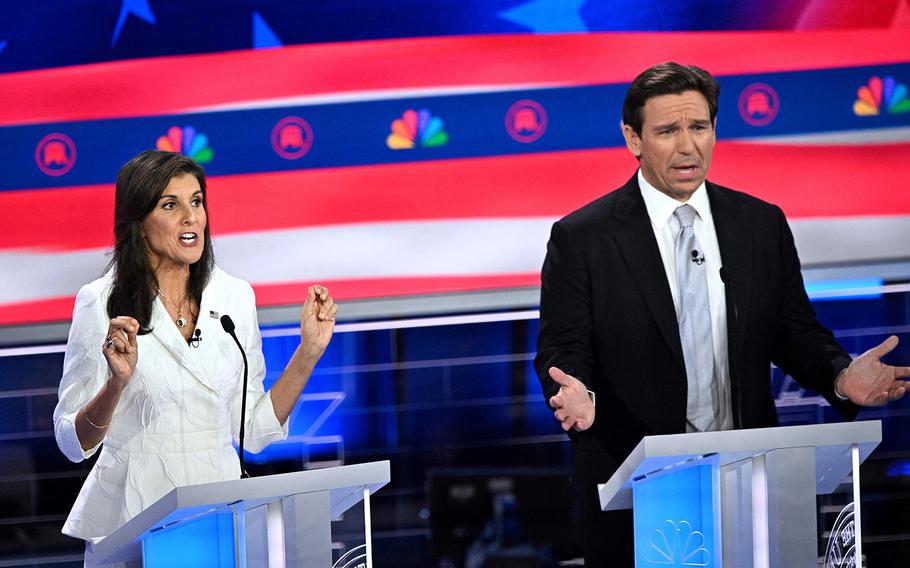
Nikki Haley and Florida Gov. Ron DeSantis on stage during the third Republican presidential primary debate in Miami on Nov. 8, 2023. (Mandel Ngan, AFP via Getty Images/TNS)
(Tribune News Service) — As Florida Gov. Ron DeSantis’ presidential campaign flames out, he’s setting the table to blame everyone but himself. His argument? The dozens of indictments filed against former President Donald Trump have “distorted” the primary and “crowded out other stuff.”
He blames aggressive prosecutors for applying the law, particularly Manhattan District Attorney Alvin Bragg who indicted Trump in April for allegedly falsifying business records related to hush money paid to adult-film actress Stormy Daniels.
“I would say if I could have one thing change, I wish Trump hadn’t been indicted on any of this stuff,” DeSantis told the Christian Broadcasting Network in an interview that aired Dec. 21.
“... Someone like a Bragg would not have brought that case if it was anyone other than Donald Trump,” he continued. “Someone like that’s distorting justice, which is bad, but I also think it distorted the primary.”
Can you think of anything more ridiculous than a candidate lamenting that his opponent has been indicted on 91 criminal charges?
The statement tells us much about the twisted values embraced by one of the nation’s two major political parties, and the precarious status of our judicial institutions. It also tells us much about DeSantis, who needs to learn how to read the room.
DeSantis is unlikely to defeat Trump in any of the primary states so he’s begun crafting the narrative for when he’s forced to fold his campaign and return to Florida to begin his political rehabilitation. But the key stages of recovery require self-reflection and a desire to change behavior. In characteristic fashion, when DeSantis casts blame he makes no mention of the fact that his campaign has been a victim of its own incompetence, or that his extremist policies have fallen flat with voters.
If the polls are a reliable indicator, the dozens of indictments and prospect of four criminal trials have only boosted Trump’s popularity among viewers of conservative media. The former president’s legal troubles had no meaningful impact on DeSantis’ inept campaign. That was his own doing — because he began with a fatal miscalculation: He attempted to out-Trump Trump.
Polls show that 30% to 40% of the GOP base are “nobody-but-Trump” voters, attracted to his cult of personality rather than his policies. The remaining Republicans are divided between Never-Trumpers, and Maybe-Trumpers who are open to alternatives such as DeSantis.
DeSantis came into office studying all the ways he could replicate the Trump agenda to become the marketing master’s heir apparent. He pursued phantom enemies, such as critical race theory (an academic discipline that is typically taught in law schools) and gender and sexual orientation (topics that weren’t part of elementary school curriculums). He signed bills banning abortions after 15 weeks and cracked down on illegal immigration.
But when Trump lost his reelection bid and DeSantis was reelected in a landslide, the Florida governor wrongly concluded that his victory was due to his finesse at navigating the culture wars that Trump had ignited. He doubled down on his already extremist policies — misjudging both Trump and his base.
Trump succeeds because he’s a duplicitous huckster. DeSantis believed that Trump’s failure to enact the culture war policies he had campaigned on was a governing failure, not realizing that Trump never intended to follow through on his promises and that his supporters didn’t seem to care.
So instead of rolling with his success, DeSantis tried to prove that he could deliver what Trump had promised. He expanded his prohibition on gender discussions in schools, penalized Disney for disagreeing with him, made book bans more prolific and signed a six-week ban on abortions. The punitive moves cost him support among many top donors and Trump’s base wondered: Why do we need a wanna-be Trump when we have the real thing?
Before launching his campaign, DeSantis was arguably the biggest threat to Trump and the best hope for anti-Trumpers. He was polling within 10 percentage points of the former president and raising eye-popping amounts of cash from a donor class eager to move on. But DeSantis managed to turn victory into defeat. Today Trump has a 50-percentage-point advantage over his rivals and DeSantis is betting everything on the Jan. 15 Iowa caucuses.
If DeSantis had been more in touch with both voters and donors, who’s to say that the segment of the GOP base that is weary of the former president’s theatrics and wary of the prospect of a presidential conviction wouldn’t be looking at him instead of former U.N. Ambassador Nikki Haley as the reasonable Trump alternative?
Some DeSantis advisers told me that he needs to finish within 10 percentage points of Trump in Iowa to raise the money he needs to linger until Super Tuesday, March 5. DeSantis hopes the former president will somehow falter by then, allowing him to scoop up Trump voters and ride to the nomination.
Dream on. That’s more delusional thinking. DeSantis will be returning to Tallahassee, and rather than blaming others his rehabilitation should include hitting the reset button in Florida, swallowing his pride and retreating on his failed policies.
Mary Ellen Klas is a politics and policy columnist for Bloomberg Opinion. A former capital bureau chief for the Miami Herald, she has covered politics and government for more than three decades. This column does not necessarily reflect the opinion of the editorial board or Bloomberg LP and its owners.
©2024 Bloomberg L.P.
Visit bloomberg.com/opinion.
Distributed by Tribune Content Agency, LLC.